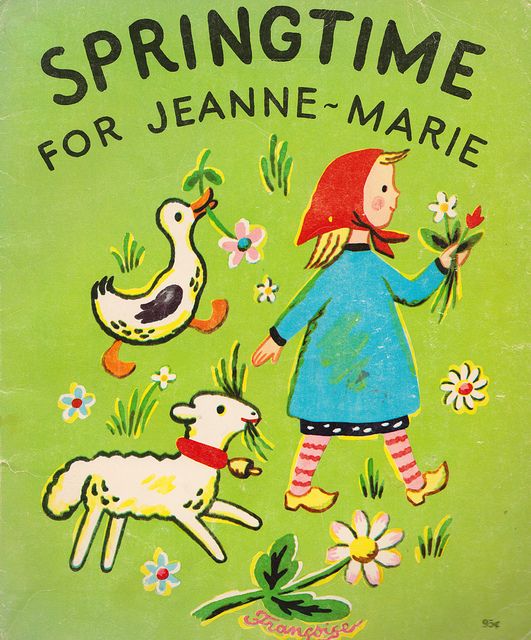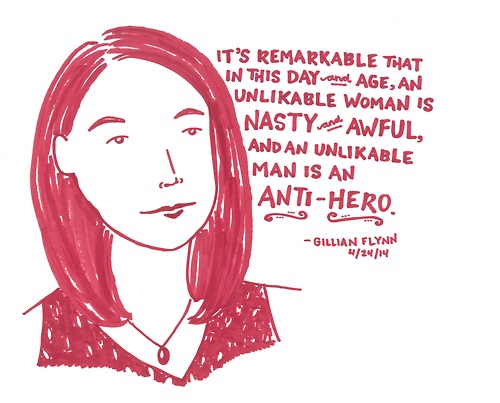8 Books That Feature Bisexual Women (And Don’t Focus On Their Sex Lives)
This month at Ask Your Friendly Neighborhood Lesbrarian we’re going to tackle something I haven’t focused on yet: bisexual women. A while ago I was tweeting about making a big list of bisexual books, and Mischa replied: “I honestly would like any kind of list, they’re a little hard to find.” Mischa further specified that it seems easier to find bi characters in YA and they’re not into erotica so they would like books that are neither.
This request gets at a few crucial issues for bi folks. There is a trend in media to have bisexual-behaving characters “reject labels” and refuse to talk about identity. Young adult literature focuses on adolescence, where identity formation is at the forefront, so it makes sense that YA is doing better than books for other ages at making bi characters explicit. But where are the grown-up bisexuals?
The other issue is the association of bisexuals with promiscuity and hypersexuality. Obviously erotica and porn by, for, and about bisexual women is rad. But the stereotype of bi women as hypersexual means it can be hard to find portrayals of bisexual women outside of sexual situations. I’m thinking especially of bi women like Twitter user Feline_fraulein who replied to my crowd-sourcing books for this article with: “I really needed to read these comments because I couldn’t think of a 1 & nearly started crying. Representation is so important.”
So with those two issues in mind, here are eight books about adult bisexual ladies going about their full, complex lives. There are definitely some sexy times to look forward to but sex isn’t the focus of the narrative. Other than that, I’ve chosen a variety of genres, including literary, historical, and paranormal fiction.
For Sizakele by Yvonne Fly Onakeme Etaghene
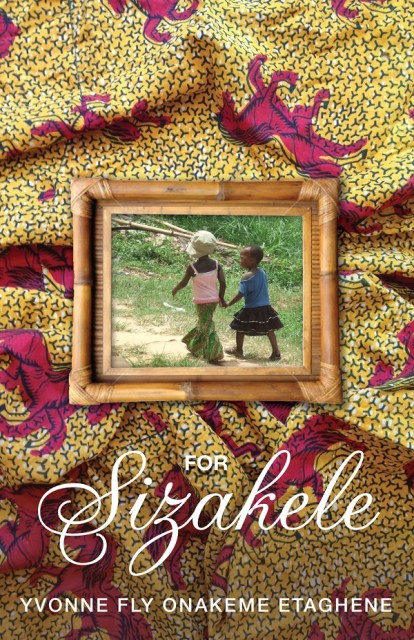
Taylor is a bisexual Nigerian college student studying in the United States, passionate about social justice and activism, although sometimes it feels like she needs more hours in the day, especially to fit in time with her girlfriend Lee, an African American basketball and piano playing stud. Lee has a lot of her own stuff going on: baggage from family trauma related to her sexuality and gender expression that sometimes spills out into abusive behavior with Taylor. (Some of this abuse is biphobic, but Taylor’s spirited, smart rebuttal is heartening). Into this complicated situation comes Sy, a Cameroonian photographer who has a lot in common with Taylor: shared language, food, and beauty traditions as well as diasporic longing. Their close friendship begins to edge towards romantic love, described beautifully in Etaghene’s lush but precise language. You can look forward to a happy but believably untidy ending.
Vow of Celibacy by Erin Judge
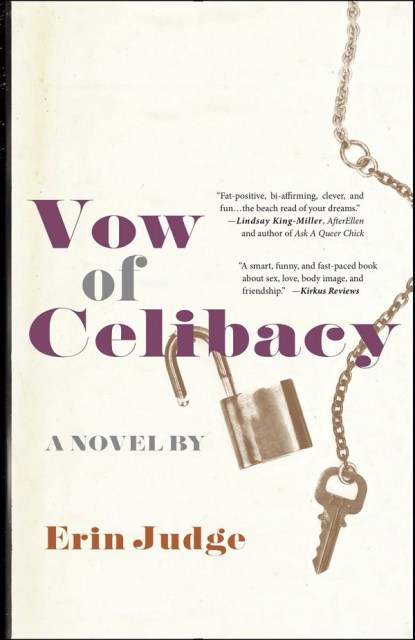
Bisexual comedian and writer Erin Judge totally hits it out of the park with this funny, sexy, fat- and bi-positive debut novel. Our heroine Natalie has recently taken a vow of celibacy after a series of dating disasters and emotional roller coasters throughout her twenties. Her plan is to shift through her past and figure out what she’s doing wrong in the dating department and how that might be related to her bisexuality. She also needs to make some changes in her thwarted career as fashion stylist and her complicated relationship with her body, plus help her BFF decide if she should reveal her true identity as the person behind a super popular blog. Vow of Celibacy would be great for fans of the chick lit genre who wish it was more queer and not fatphobic.
Corona by Bushra Rehman
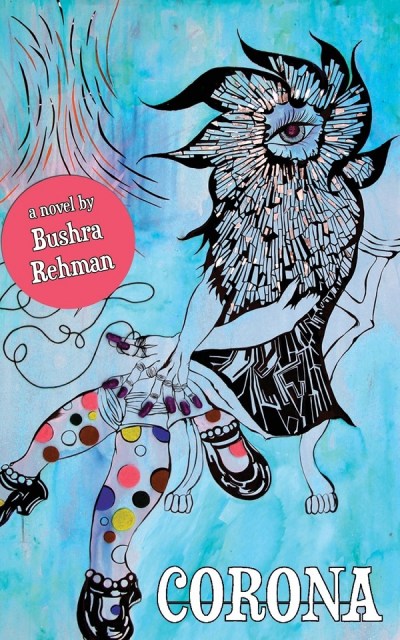
Corona is a series of short stories about the same character Razia Mirza, a Pakistani American woman from a neighborhood called Corona in Queens, NY. The first stories center on Razia’s experiences in Corona’s tight Muslim community, whereas later the book follows Razia after her rebellion leads to her excommunication and she hits the road to explore the rest of America. Some stories focus on a doomed affair with Ravi, a charismatic guy who’s heading back to his home country of India soon, while others are about hitchhiking with her girlfriend and pranking the creepy older straight guys who pick them up. The snippets of Razia’s life are immediate and intense, with a great sense of place, whether it’s the smell of sweaty desi dance parties or the sound of old bread trucks driving down Corona streets. Rehman’s writing is often poetic and frequently very funny.
The Life and Death of Sophie Stark by Anna North
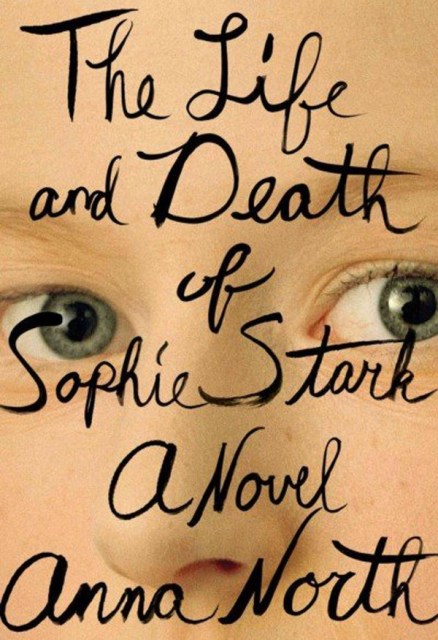
A uniquely structured novel, The Life and Death of Sophie Stark is centered on one enigmatic woman and told only from the point of view of the important people in her life, never giving her her own voice. North does a beautiful job drawing each character and conveying their distinctive voices. As each character — her (ex)-girlfriend, brother, husband, old college crush, and others — gives their version of Sophie, the charismatic, visionary artist at the heart of the story slowly begins to take shape. You learn that Sophie isn’t an ordinary filmmaker: she takes the stories of people she meets and turns them into movies. But her ruthless dedication to creating the best work of art leads, again and again, to a startling disregard for the loved ones who are the subjects of her films, until her betrayal hits a final high point. Take care of yourself while reading this book, as it contains scenes of sexual assault and suicide.
Black Girl in Paris by Shay Youngblood
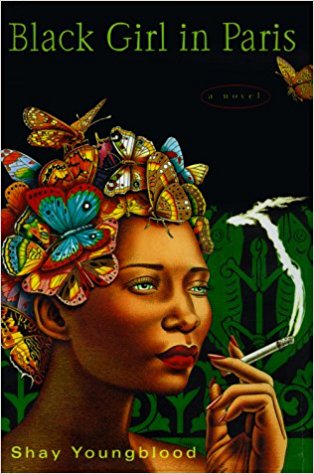
Eden is a 26-year-old black woman from Alabama and an aspiring writer who decides to take an after-college trip to Paris to retrace the footsteps of her literary heroes like James Baldwin, Josephine Baker, and Langston Hughes. With only $200 in her pocket, Eden sets off and falls into various menial jobs, like posing nude for artists. She moves on to petty theft with the help of her friend / lover Luce who also shows her the hidden pleasures of Paris. Other fascinating secondary characters include Eden’s androgynous kind-of-boyfriend, Ving, and his friend Olu-Christophe, an undocumented Haitian person. While she’s connecting with fellow ex-pats and working, Eden doesn’t have as much time for writing as she’d hoped, although exploring Paris’s seedy underbelly provides inspiration. Youngblood avoids a strict linear narrative where Eden figures everything out, instead giving us a whimsical, improvisational jazz-like novel full of musings on art, race, love, and sex.
Silver Moon by Catherine Lundoff
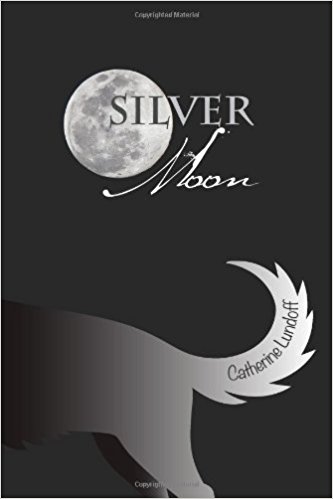
The association of adolescence with werewolfism makes sense, what with teens going through all those body changes, new urges, and getting hair in new places, but Catherine Lundoff has turned this link on its head by creating a novel where menopause turns people into werewolves. That’s right, Silver Moon is about menopausal women werewolves. The main character is Becca Thornton, a divorced woman who’s only dated men up until middle age. She has just come out as bisexual, prompted by a crush on her next-door neighbor Erin. After discovering she’s a werewolf, Becca realizes she’s not the only one in her situation and joins up as the newest member of a local pack. Happily, she’s not the only queer lady. But her new nights spent howling at the moon and protecting her home are just the beginning as her pack realizes a group of werewolf hunters are in town and they have their eyes set on Becca.
Give It To Me by Ana Castillo
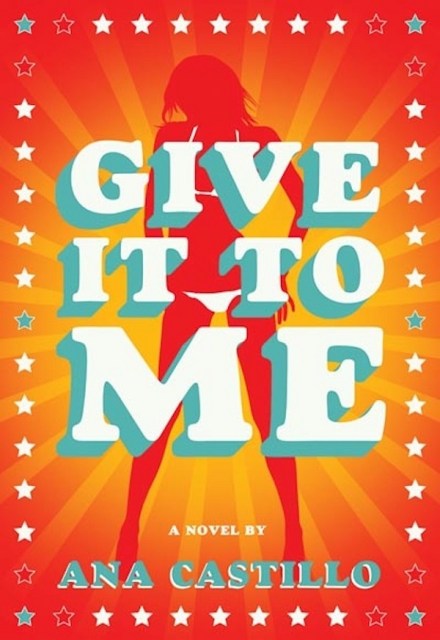
Palma Piedras is a recently divorced 43-year-old Chicana. Assessing her life now that she’s left her husband, Palma starts off by reconnecting with her younger cousin, falling back into their on-again, off-again sexual relationship. This is the beginning of what could be called a bisexual romp, as Palma moves around the US and from partner to partner. But underneath what might seem light-hearted or escapist is Palma’s real desperation, as she fruitlessly searches for belonging. The novel really resists the typical linear narrative of a character learning, growing, and changing. It’s not so much that Palma has lost her way and needs to get back on track. It’s more that in her early forties she has never found her way. Give It To Me could be a miserable book, especially as it also investigates racism and sexual assault. But Castillo’s dark, biting sense of humor throughout really changes the tone and adds crucial relief, managing to make a novel that is heart-breaking, sexy, and hilarious at the same time.
Hild by Nicola Griffith

This epic historical novel set in seventh-century Britain is a fictionalized account of St Hild of Whitby, a Catholic Saint and the king’s youngest niece — and in Nicola Griffith’s version, bisexual. Hild starts in Hild’s pagan childhood being raised by her politically ambitious mother. Hild is a curious, smart child with powers of observation and prophesy so strong that she becomes the king’s seer, a position of privilege but also danger: if she leads the king astray, it could be fatal not only to herself but her family and all those important to her. Griffith has crafted a leisurely paced novel with supremely detailed world building, bringing early medieval Britain alive, including political strife and intrigue, the sexuality norms of the time, and richly characterized medieval women. The novel ends as Hild approaches age 19, but don’t worry! Griffith is apparently planning a trilogy, although no release date for a sequel has been announced yet.
All of the other installments of the column have featured books with bisexual women characters, but for more bi lady adults in particular, have a look at The Stars Change by Mary Anne Mohanraj from the column on sci-fi (more than one South Asian bi character!) and My Education by Susan Choi from the list of lesbian romance audiobooks, which features a very sexy but doomed romance between two bi women. And for more bisexual books, do not miss the majestic Bisexual Books tumblr.
Lez Liberty Lit #45: Saved By The Bell Jar
by carolyn & riese

The New York Times bestseller lists for young adult books are, unsurprisingly, not very diverse.
Black Lesbian Books recommended some new books to read, including The Girl With The Treasure Chest, The Rules, Yabo and more.
The finalists for the Bisexual Books Awards include Hild by Nicola Griffith, My Education by Susan Choi, The City of Devi by Manil Suri, Bi: Notes for a Bisexual Revolution by Shiri Eisner, Inheritance by Malinda Lo, Love in the Time of Global Warming by Francesca Lia Block, and many more titles to read immediately.
Elise Cowen is the female beat poet you’ve never heard of.
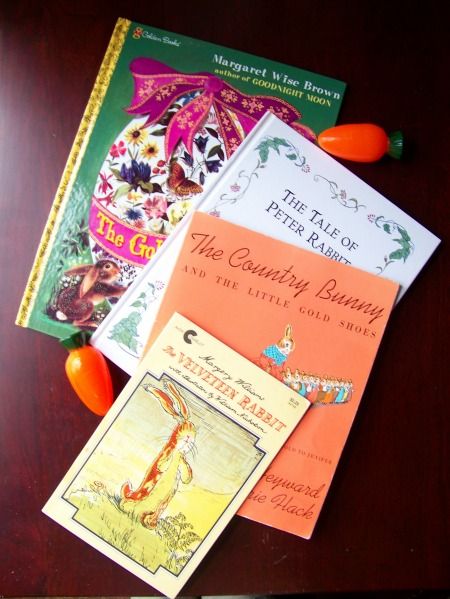
via kc adventures
In an interview at the New York Times, author Emma Donoghue discusses what she’s reading, the worst book she’s ever read and the best lesbian historical fiction: “Here’s one each for the last six centuries, for starters: Philip Sidney’s ‘Arcadia’; Honoré d’Urfé’s ‘Astrea’; Denis Diderot’s ‘The Nun’; Henry James’s ‘The Bostonians’; Dorothy Strachey Bussy’s ‘Olivia’; and Sarah Waters’s ‘Fingersmith.'”
Roxane Gay, Leslie Jamison and Michele Filgate discuss sexuality, essays and feminism at Salon:
“Gay: I tend to not like essays that are merely confessional, without any sort of forward progress, without any sort of catharsis or just, direction. And I don’t begrudge people writing those essays because clearly they need to do something, they need to unburden themselves. But I think we see a lot of unburdening that is not productive, and I don’t really love that. And I also don’t love essays that lack intellectual rigor, which we see quite a lot of, because the machine sort of demands that we, you know, something happens and we respond, and we respond right away. And it’s a race, you know, how quickly can we get this response up? And in doing so, we create arguments sometimes that aren’t rigorous and don’t make any sense and are full of straw men or other rhetorical fallacies. And that’s troubling.”
The European Bureau of Library, Information and Documentation Associations is trying to get more ebooks in public libraries. Currently, European public libraries lack access to over half of new ebook titles.
The cast of Fun Home are performing at the College of Charleston, which might have its budget cut by the state for encouraging students to read the book by the same name.
Smartphones can help people read more.
Giovanni’s Room, one of America’s oldest queer bookstores, will close May 17. Read our piece on the LGBT bookstore closing epidemic here.
The New Yorker asks, “How much gay sex should a novel have?”
A historically accurate version of Choose Your Own Adventure.
My childhood hero author Kit Pearson has won the BC Lieutenant Governor’s Award for literary excellence.
“#90sBookTitles” is a thing.
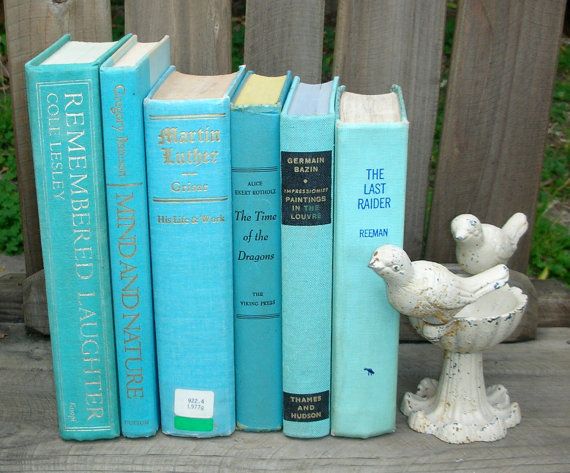
via etsy
Rachel Fershleiser discussed why she likes the bookternet.
The world’s first 24-hour bookstore has opened in Beijing.
In celebration of Shakespeare’s 45oth birthday, Stefanie Peters discusses the women making Shakespeare at the Millions.
Mental Floss has mapped the most famous book in each state.
Canadians are most likely to finish a book, Germans read the fastest, Americans’ most popular genre is “arts and music,” and other insights using data from Scribd’s users.
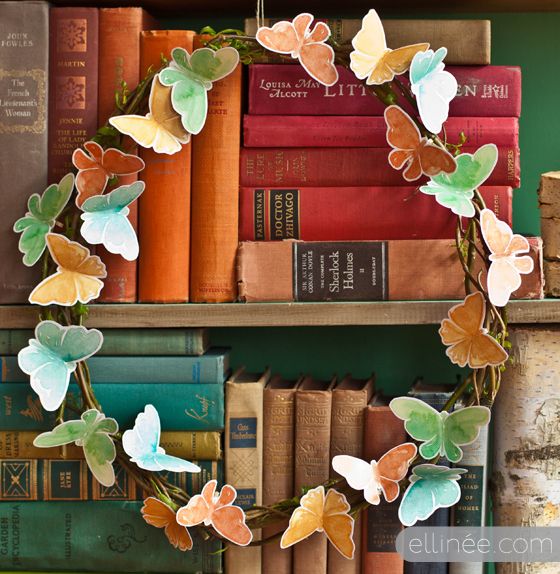
via elli
Nicola Griffith’s new short story, “Cold Wind,” is available online:
“Two women came in laughing. The one in jeans and a down vest seemed taller, though she wasn’t. Her cheeks were hectic, brown eyes brilliant, and not only from the cold. Women have lit up that way for thousands of years when they have found someone they want, someone whose belly will lie on theirs heavy and soft and urgent, whose weight they welcome, whose voice thrills them, whose taste, scent, turn of the head makes them thrum with need, ring and sing with it. They laugh. They glow.
The other was paler, the red-brown of old ivory stained with tea. Her eyes were brown, too, slanted and wide set. Deep brown, velvet. Snow dappled her hair. She stood by the door, blinking, as people do when they walk from dark into light.
My aorta opened wide and blood gushed through every artery, all my senses gearing up. But I pretended not to see her. I gazed out of the window, at the sleet turning to snow, the air clotting with cold, and the pavement softening from black to gray. Reflected in the glass the women around me were coming alert, spines straightening, cheeks blooming, capillaries opening.
She was here. She was real. I’d been right.”
The winners of the Publishing Triangle Award have been announced, and include White Girls by Hilton Als, Passionate Commitments: The Lives of Anna Rochester and Grace Hutchins by Julia M. Allen, Enchantée by Angie Estes, If You Could Be Mine by Sara Farizan and more.
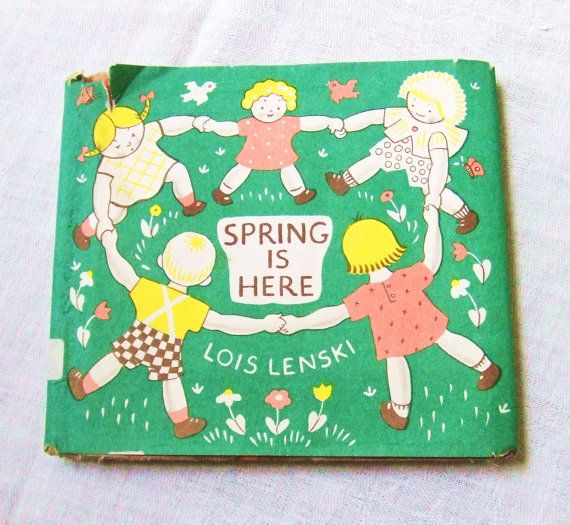
via spring is here
At the Lesbrary, Abigail reviewed She Overheard Murder by Jean Sheldon. TB reviewed Everybody Else’s Girl by Sarah Sawyers-Lovett. Kathleen Wheeler reviewed Finding the Grain by Wynn Malone. Krait reviewed Love in the Time of Global Warming by Francesca Lia Block.
At Lambda Literary, Keith Glaeske reviewed Dust Devil on a Quiet Street by Richard Bowes. Katherine V. Forrest reviewed The City of Palaces by Michael Nava. Isaiah Vianese reviewed Like a Beggar by Ellen Bass. Antonio Gonzalez Cerna reviewed Freakboy by Kristen Elizabeth Clark. July Westhale reviewed Give It To Me, a book of poems by Ana Castillo. Megan Milks also shared a week in her life in the Banal and the Profane.
Recently, on Autostraddle: Gabby wrote about Sister Spit. Maggie wrote about diary feelings and diary scrapbooking. Audrey wrote about YaliniDream and Sonya Renee for National Poetry Month. Mey wrote about kickass ladies being nominated for the Eisners. Laura provided some Home Decorating Tips for the Trend-Conscious Bookpocalypse Participant. You told us all your favorite poems to win a Write Bloody giveaway. Malaika read Diane Obomsawin’s “On Loving Women”. Our writers celebrated National Library Week by discussing Our Favorite Libraries!
Events To Watch Out For:
May 6, Brooklyn: Roxane Gay will be in conversation with Sari Botton at Community Bookstore (143 7th Ave), 7 p.m. RSVP on the Facebook page.
Now to 25 May, New York: The 2014 Whitney Biennial will feature a ton of books and archival material, including some from Semiotext(e), and features work that challenges disciplines and genders and binaries (945 Madison Ave. at 7th St.).
May 22–25, Winnipeg: Writing Trans Genres: Emergent Literatures and Criticism will be held at the University of Winnipeg. (You can also live stream it.)
30 May, New York: Girls Write Now’s 2014 CHAPTERS reading series continues with guest author Ana Castillo at Scholastic (557 Broadway), 6 p.m.
20 June, New York: Girls Write Now’s 2014 CHAPTERS reading series concludes with guest author Christina Baker Kline at Scholastic (557 Broadway), 6 p.m.
Know of a queer event with literary merit? Send it to us! The Liberty Lit is bi-weekly.
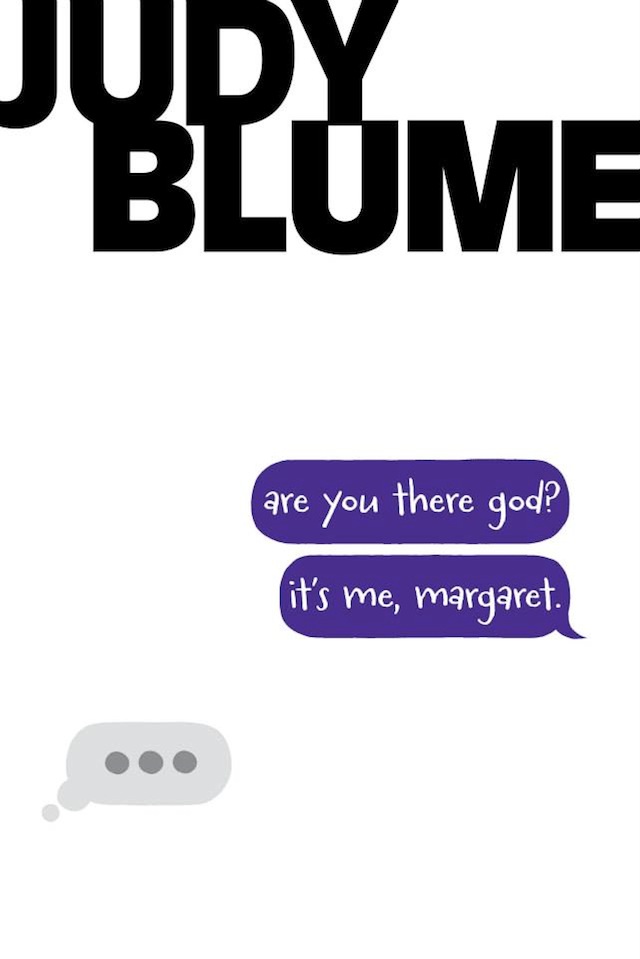
via powells
feature image via bookshelves.tumblr.com
Top 10 Queer and Feminist Books of 2013
2013 has been truly awesome for new queer and/or feminist things to read. Here are some of the best ones.
The Top 10 Queer/Feminist Books of 2013
10. How Poetry Saved My Life, by Amber Dawn
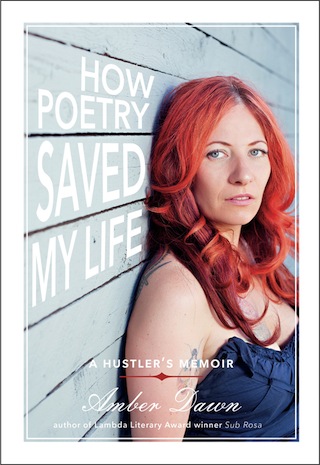
Amber Dawn combines memoir and poetry into something that is both at once as she discusses her experiences as a writer, sex worker, survivor and queer-identified person.
In her interview with Ali, Dawn says:
“Many memoirs cover a chronological time frame—travelling from the author’s “inciting moment, through a sort of character or personal arch, to an ending resolution. I think this popular memoir formula is much too tidy to capture most of our lives, especially if our lives are under-represented in the mainstream. Plus, I didn’t have the emotional strength to write a chronological memoir about sex work and survivorship. Poetry offered me a language of beauty and dynamism to write out my more vulnerable ideas and experiences. I’ve always felt comfort in reading and writing poetry. Poetry is the closest thing I have to a spirituality.”
9. The Summer We Got Free, by Mia McKenzie
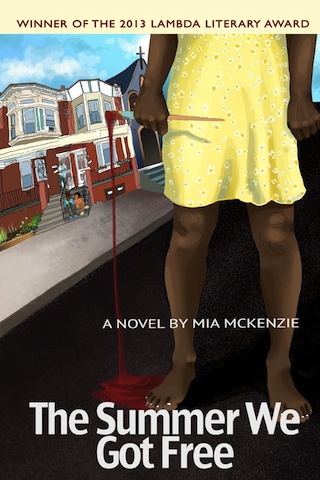
The Summer We Got Free is a fearless, semi-magical-realist queer coming-of-age story that also won the 2013 Lambda Literary Award for debut fiction. And Moya Bailey liked it.
In a review at Lambda Literary, Dawn Robinson writes:
“I will not give you all of the salient details of this layered, complex, and absorbing novel in this brief review—no spoilers here. Still, I need to ask you a few clarifying questions. Are you interested in a novel that is simultaneously critical social commentary, ghost story, murder mystery, and queer love story? If you were interested in such a novel, would it matter to you that the craft of the writing is deceptively plain, and in that simplicity, achingly poignant, laser-like in its facility and effect? Me too. I love that.
Finally, if you found out that the author was a fiercely brilliant black queer woman, who layers on discovery, insularity and secrets with a deft touch, would you be queuing up to get a copy of this book? Thought so.”
8. Nevada, by Imogen Binnie
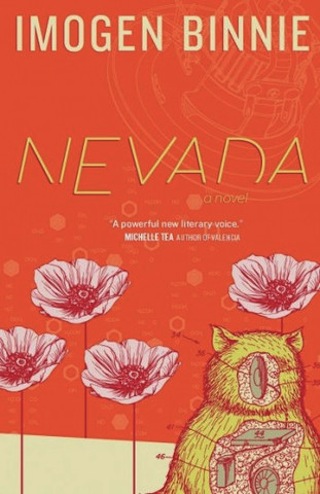
Nevada is about what happens when you work at a used bookstore and love your bike more than your girlfriend and drink maybe too much and take drugs but inject only estrogen and break up with your girlfriend and travel across the country.
In an interview with Dan Fishback on Emily Books, Binnie says:
“But with Nevada specifically I was thinking a lot about what kinds of stories we are told and therefore get to tell about trans women and how they almost never have much to do with the lived experiences of, like, myself, or most of my friends. So this project, for better or worse, was just to tell a different story. And also, to write a book I wish I could read. So while writing the book wasn’t for an audience in a specific way, I wrote it with an awareness of (and anger at) the boring tropes we see in trans narratives over and over.”
7. Bi: Notes for a Bisexual Revolution, by Shiri Eisner
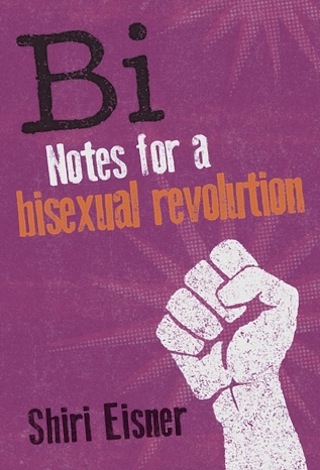
Eisner describes Bi as her “attempt to create a radical bisexual politics, and it is deeply informed by intersectionality, feminism, trans politics and race politics – not in the least because I myself am a trans* person of color.” She addresses bisexual politics through multiple facets and is informed by feminist, trans* and queer politics, theory and activism.
A.J. Walkley calls it a “definite must-read” and writes:
“The research Eisner has done for this book is clear from the beginning and the result is an incredible historical review of the bisexual movement from a whole host of perspectives and views, as well as clear ideas for revolutionizing it from here on out. With chapters on bisexuality, monosexism and biphobia, privilege, feminism, women and men, trans*, radicalization and what Eisner calls the “GGGG movement,” or the Gay-Gay-Gay-Gay movement, readers are exposed to the major issues that have impacted bisexuals over the years and those that are affecting us today.”
6. One Hundred Apocalypses and Other Apocalypses, by Lucy Corin
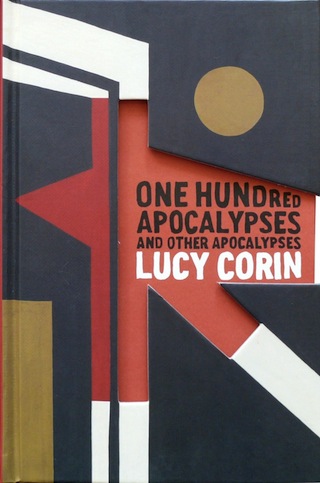
Lucy Corin’s experimental collection of 100 short stories about the end of the world has received high praise from the Rumpus and the LA Review of Books, which calls it “strange, transportive, and challenging,” “ageless,” and draws flattering comparisons with George Saunders.
In an interview with the Rumpus, Corin says:
“I decided I wanted to write an apocalyptic narrative, but the more I thought of it, it seemed bizarre and untenable to me to pick one, so I just didn’t.
I was interested in beginning and ending something as quickly as possible, as many times as possible, as a way of getting at a cultural fantasy life that has to do with the apocalyptic. Nobody can live in this culture and not realize that people really love this shit. We just love it. And so I started writing one after another and investigating it myself and talking to people about their own apocalyptic fantasy lives.”
5. Excluded: Making Feminist and Queer Movements More Inclusive, by Julia Serano

In Excluded, Julia Serano (author of Whipping Girl) discusses how queer and feminist movements challenge sexism but also police gender and sexuality, and what to do about that.
In an interview with Persephone Magazine, Serano says:
“Obviously, all these forms of sexism and marginalization are different, and I am not trying to conflate them or imply that they are all the same. But in studying them, it seems clear that there are parallels between all of them — in the way that they are enforced, and in the way that the marginalized group tends to react to their circumstance. Rather than merely petition for the inclusion of each excluded group on a one-by-one basis (as I did in Whipping Girl, and as many others before me have done), I wanted to try to get at the root of why we tend to create double standards and hierarchies, and how we can learn to recognize and challenge them in a more general sense. And I wanted to offer possible solutions that will help to reduce exclusion and marginalization in all cases, whether in the straight-male-centric mainstream or within our own queer and feminist communities and movements.”
4. Blue is the Warmest Color, by Julie Maroh
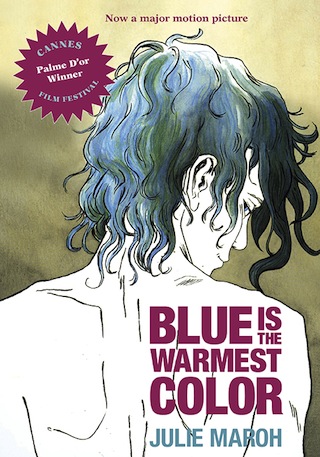
Everyone’s been talking about the film that won the Palme d’Or at the 2013 Cannes Film Festival for months, and it’s been getting a lot of criticism for its rather extended lesbian sex scene. But the graphic novel the film is based on is sweet and lovely and significantly less male gazey.
In a review at Slate, June Thomas writes:
“Maroh, who was just 19 when she started the comic, manages to convey the excitement, terror, and obsession of young love—and to show how wildly teenagers swing from one extreme emotion to the next. The graphic novel also contains some stirring sex scenes. […]
Ultimately, Blue Is the Warmest Color is a sad story about loss and heartbreak, but while Emma and Clementine’s love lasts, it’s exhilarating and sustaining. In the scene reproduced here, Emma tells the infatuated Clementine about her coming-out process and her relationship with her girlfriend, Sabine.”
3. My Education, by Susan Choi
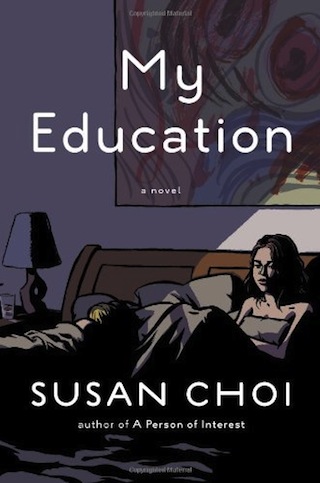
The latest novel from Pulitzer Prize finalist Susan Choi is about a grad student who begins an affair with her professor’s wife, and who then reflects on the affair 15 years later. In the New York Times, Emily Cooke calls it “elegantly written,” and writes:
“Choi has taken seriously the sexual love between two women who see themselves as straight. This choice of subject matter is an exciting one, for if a number of the great novels of the past century have been stories of gay love, no really adequate literature of bisexuality exists. Regina does not concern herself with the terms ‘lesbian’ or ‘bisexual,’ and she is nonchalant about the sex of her new lover. […] In love of great intensity and depth the specificity of the beloved can overwhelm any category he or she belongs to — and Regina swears that her feeling for Martha is ‘so unto itself it could not refer outward, to other affairs between women or even between human beings.'”
2. Hild, by Nicola Griffith
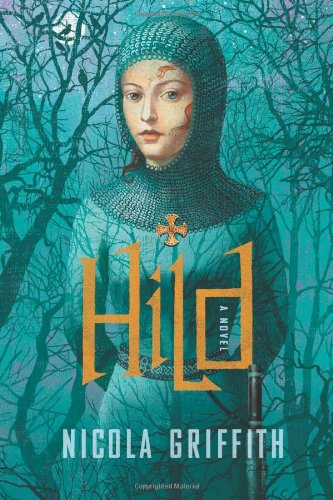
Set in violent seventh-century Britain, Hild tells the story of the pre-sainthood St. Hilda of Whitby, a girl who establishes herself as the seer to a ruthless king who finds her indispensable — until he doesn’t. It’s impossible not to love Nicola Griffith — she’s also the author of the feminist sci-fi novel Ammonite, the suspense-thriller-lesbian-romance The Blue Place, and lovely defences of why good sex in literature is important and Hild’s (bi)sexuality.
In an interview with herself at the Nervous Breakdown, Griffith says:
“As soon as I picked up her story–she was working out the weave of seventh-century British politics, tracing influences to their source–I thought, This is where I belong. […]
This story is epic in many ways–wars, dynasties, revenge, friendship, religious power struggle, ethnogenesis, sex, risk, joy–but in others it’s not. There’s no Meanwhile, a thousand leagues away in the point-of-view of a character you’d forgotten existed…, for example. Hild is in every single scene.”
1. The Feminist Porn Book, edited by Tristan Taormino
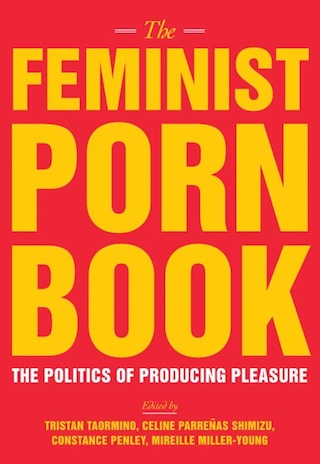
The Feminist Porn Book already feels like it’s been around for years just because it should have been — it fills a hole in contemporary feminist writing so big that I almost feel bad making a joke about filing holes.
The book features feminists from the porn industry and academia, including Susie Bright, Candida Royalle, Betty Dodson, Nina Hartley, Dylan Ryan, Jiz Lee, April Flores and more, talking about where feminist porn has been and where it might go. In an interview with Salon, Taormino says:
“One of the things we’re responding to is that there’s this notion that certainly is propagated by anti-porn feminists and other people, which is that there is one thing called porn with a capital ‘P.’ And it’s monolithic and we can qualify it in all these different ways and say this is what it looks like and this is what it does. As Constance says, ‘That’s just not true.’ What there is is a whole series of pornographies with a lowercase ‘p,’ and that’s what we have to look at and investigate. There is no one thing, and she even challenges the notion that there is a clear division between mainstream porn and independent porn, or mainstream porn and feminist porn, because there are feminists working within the mainstream porn industry and then there are feminists working independently, and there are non-feminists working independently, and vice versa. They’re all over the place.”
If your favorite book isn’t included here and you’ve got feelings about that, please comment in all-caps using as much punctuation and self-righteous indignation as possible! Or just tell me about what I should read next.
Read All Of The Books: The Fall 2013 Queer Books Preview
feature image via Shutterstock
by Carolyn & Mey
The fall is looking good for queer reading! Books look out for include new work from Jeanette Winterson, S. Bear Bergman, Nicola Griffith, Malinda Lo, Julia Serano, Radclyffe, Kathleen Warnock and a ton of other heavy hitters. With forthcoming history and historical fiction, erotica and academic analysis, literature and genre fiction, and Buffy and Batwoman, you won’t have any problems finding something new to read.
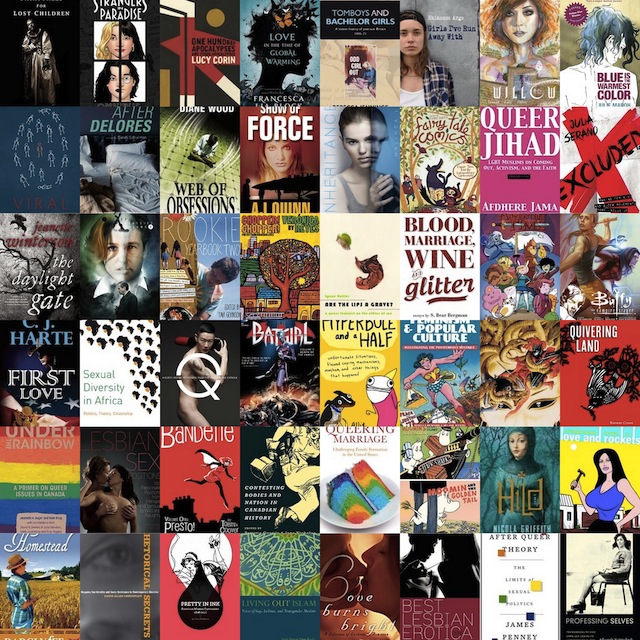 August
August
One Hundred Apocalypses and Other Apocalypses, by Lucy Corin: The series of short stories in this new collection explore endings and new beginnings, whether of relationships or of the world. Corin uses an experimental style, varying lengths, type size and tone, to muse “not just on the end of the world, but the rapture of existence.”
Love in the Time of Global Warming, by Francesca Lia Block: Block’s writing has a dream-like quality and her unique voice — best known in her queer-friendly children’s book, Weetzie Bat, is at full force in her latest YA novel. When Penelope’s family are swept away in a flood, she embarks on an Odyssey-like quest to find them and encounters sirens, witches, magic and love.
Tomboys and Bachelor Girls: A Lesbian History of Post-War Britain 1945–71, by Rebecca Jennings: Jennings explores lesbian identity and culture in post-war Britain. Using oral histories and archival sources, she illuminates Britain’s lesbian social scene, both in London nightclubs and also in magazines and organizations across the country, in contrast to the conventional picture of post-war austerity.
September
Fairytales for Lost Children, by Diriye Osman: A series of narrators — young lesbian and gay Somalis on the edge of self-revelation — navigate family, identity and place in this collection of short stories that defy categorization. Alison Bechdel writes of the collection, “The characters in these fairy tales are displaced in multiple, complicated ways. But Osman’s storytelling creates a shelter for them; a warm place which is both real and imaginary, in which they find political, sexual, and ultimately psychic liberation.”
Girls I’ve Run Away With, by Rhiannon Argo: Sister Spit’s Rhiannon Argo (who Laneia once interviewed) founded Moonshine Press through an Indiegogo campaign in order to publish Girls I’ve Run Away With. Lo Flynn falls in love with rebellious Savannah Blanco and they go on the run while facing coming out, dysfunctional families, being kicked out, mental health issues and more.
Strangers In Paradise Omnibus, by Terry Moore: This is the ultimate collection for any fan of one of the most groundbreaking series for lovers of lesbian and queer characters in comic books. This edition contains all 107 issues of the series, including all of the spin offs. Moore’s masterful art and storytelling are at their highest levels in this two-book package.
Willow Volume 1: Wonderland, by Jeff Parker, Christos Gage and Brian Ching: Everyone’s favorite lesbian witch from Buffy is back in her own title, setting off on her own on a quest that will lead her to finding old allies and new battles. Magic has disappeared from the world and Willow is determined to get it back, no matter how dangerous the journey might be or where it might take her.
Blue is the Warmest Color, by Julie Maroh: First published in French as Le bleu est une couleur chaude, Blue is the Warmest Color is the English translation of the graphic novel recently adapted into the film that won the Palme d’Or at the 2013 Cannes Film Festival. Clementine discovers the power of love when she meets the blue-haired Emma in a lesbian bar. Their relationship challenges Clementine’s ideas about herself and her identity.
Viral, by Suzanne Parker: Parker’s slim book of poetry offers a response to Tyler Clementi‘s tragic suicide that explores sexuality, masculinity and shame. Carol Muske-Dukes calls the poems “relentlessly tender, impossibly empathetic […] which echo and clarify the body of grief.”
After Delores, by Sarah Schulman: Schulman’s acclaimed 1988 novel about an unnamed New York waitress recovering after her girlfriend, Delores, leaves her appears in a new edition from Arsenal Pulp Press. After Delores is as much a sexy novel about heartbreak as it is a look into the Lower East Side’s lesbian culture in the 1980s.
Web of Obsessions, by Diane Wood: Jordan Mackenzie is a social worker in a women’s prison when she meets assistant superintendent Danielle Veillard. Her ex-girlfriend and Danielle’s ex-husband stand in their way as begin a romance, and a prison drug ring and mysterious death make the stakes even higher.
Show of Force, by A.J. Quinn: Correspondent Tate McKenna brings navy pilot Lieutenant Commander Evan Kane home after an embassy dinner and the two can’t imagine separating again — even if it means risking their lives. Following Quinn’s romantic suspense novel Hostage Moon, Show of Force promises to be a one-sitting read.
Inheritance, by Malinda Lo: The sequel to Adaptation, Lo’s young adult contemporary sci-fi thriller, continues to follow Reese Holloway as she deals with being implanted with alien DNA, government conspiracy and her feeling for her ex-girlfriend Amber and her best friend David. Inheritance explores sexuality, adolescence and “the other.” (Read Autostraddle’s interview with Lo on Adaptation.)
Batwoman Vol. 3: World’s Finest, by J.H. Williams III: The only lesbian superhero to have her own title at one of the major comic book publishers is back in action as she partners up with the most iconic of all lady superheroes, Wonder Woman. Not only do you get to see two of DC’s coolest ladies teaming up to fight mythological monsters, but also Batwoman takes some serious steps forward in her relationship with a fellow crime fighter.
Fairy Tale Comics: Classic Tales Told by Extraordinary Cartoonists, edited by Chris Duffy: This book features classic fairy tales, some familiar and some new, retold in comic book form by a super talented group of people including queer comic-maker Emily Carrol, Love and Rockets creators Gilbert and Jaime Hernandez, and Jillian Tamaki, the illustrator of Skim.
Queer Jihad: LGBT Muslims on Coming Out, Activism, and the Faith, by Afdhere Jama: Jama, author of Illegal Citizens: Queer Lives in the Muslim World, explores individual and group efforts to reconcile sexuality and faith. He discusses the post-9/11 West, law in the East, the new generation of queer Muslims, voice, change and rights.
October
Excluded: Making Feminist Movements More Inclusive, by Julia Serano: “Julia Serano is a careful and astute critic of the ways that trans women have been stereotyped and dismissed in popular culture, feminism, and psychology,” says Patrick Califia on the back of Whipping Girl. In Serano’s newest book, Excluded, she details how feminist and queer movements police gender and sexuality at the same time as challenging sexism, and how to foster inclusivity.
The Daylight Gate, by Jeanette Winterson: Lambda-Award-winning author Winterson is best known for Oranges are Not the Only Fruit and Written on the Body. Her new novel, set in seventeenth-century England, centers on the 1612 witch trials and a dark, paranoid moment in history.
Rookie Yearbook Two, edited by Tavi Gevinson: The second book from Rookie, an online magazine for teenage girls, isn’t just for those of us still in high school. Contributors include Judy Blume, Grimes and Mindy Kaling as well as interviews with people like Emma Watson and Carrie Brownstein. Yearbook Two collects the best of the website from its second year and is perfect for teens or anyone who remembers being one.
X-Files Classics Vol. 2, by Charlie Adlard and others: Although it’s not explicitly queer, it’s hard not to have a special spot in our hearts for FBI agent and medical doctor Dana Scully. This book features stories that were not featured in the TV show or movie and can only be found in the comics, including “Feelings of Unreality,” “Home of the Brave” and “Night Lights.”
Chopper! Chopper! Poetry from Bordered Lives, by Verónica Reyes: “Reyes resurrects old-time shops and hangouts. They memorialize the land alongside edifices of refuse, sterile towers, man-made deserts and rivers, machines that suffocate the sky, fields locked in the historical cycle churning out the fieldworker’s woe. Queers, dandies, cholos, mariachis the same as ‘Chumash, Pomo, Modoc’ ramble these streets,” writes Kristin Naca of Reyes’s new collection of poetry, which captures the lives of immigrants, Mexican Americans, Chicanas/os and la jotería.
Are the Lips a Grave?: A Queer Feminist on the Ethics of Sex, by Lynne Huffer: Balancing current debates around both queer and feminist theories, Huffer — also the author of Mad for Foucault: Rethinking the Foundations of Queer Theory — looks at queer sex, sodomy laws, interracial love, porn and work-life balance to rethink ethics and sexual morality.
Blood, Marriage, Wine and Glitter, by S. Bear Bergman: Bergman’s earlier books — Butch is a Noun, The Nearest Exit May Be Behind You, and Gender Outlaws: The Next Generation (co-edited with Kate Bornstein) — are all seminal texts on gender and trans* life and issues. In Blood, Marriage, Wine and Glitter, Bergman considers different ideas of family from all perspectives with a voice that is both honest and hilarious.
Adventure Time: Fionna & Cake, by Natasha Allegri: This is the first trade paperback of comics based on the fantastic genderbent Adventure Time episodes. Fans of the show will love this comic illustrated and written by storyboard artist and Fionna & Cake creator Allegri.
Buffy The Vampire Slayer Season 9 Vol. 4: Welcome to the Team, by Andrew Chambliss, Georges Jeanty, Karl Moline, Dexter Vines and Andy Owens: The second comic book-only season of the series that helped a lot of us figure out our queer feelings continues with Buffy fighting off a horde of zombies before being recruited to join a team that’s planning on taking down one of the most powerful enemies she’ll have to face — the Siphon.
First Love, by C.J. Harte: Harte’s novels thrive equally on romance and drama. In her latest, Jordan Thomson, daughter of the president of the United States, hires Drew Hamilton, once and future rancher and current medical student, as a tutor. Both women learn more than they expected.
Sexual Diversity in Africa: Politics, Theory, Citizenship, edited by S.N. Nyeck and Marc Epprecht: The contributors in this volume of essays discuss contemporary debates on and issues around sexuality and gender identity. Same-sex networks, ex-gays, pseudo-scientific gay “cures,” the “kill the gays” bill in Uganda, relationship dynamics between women who sleep with women, Caster Semenya and nationalism all show the problems with oversimplified discussions of heterosexuality and homosexuality, Africa and the West and the closet and being out.
A Queer History of Fashion: From the Closet to the Catwalk, edited by Valerie Steele: As the director and chief curator for the Museum at the Fashion Institute of Technology, Steele has been called one of “Fashion’s 50 Most Powerful” by the New York Daily News. Her new book talks about gay designers, fashion and style within the queer community and more to show the impact of gay culture on modern fashion.
Batgirl Vol. 3: Death of the Family, by Gail Simone and Ed Benes: Collecting issues #14 to 19 of Batgirl, as well as Batman #17, Batgirl Annual #1 and a story from Young Romance #1, this run features Batgirl facing off against not only the Joker, but also against her dangerous brother. This is also the run of the series where Batgirl’s roommate Alysia Yeoh comes out as transgender.
Hyperbole and a Half: Unfortunate Situations, Flawed Coping Mechanisms, Mayhem, and Other Things that Happened, by Allie Brosh: The long-awaited book from acclaimed graphic humor blog Hyperbole and a Half includes half unpublished content and all hilarity. The book chronicles cake eating, owning one neurotic dog and one mentally challenged one, depression, anxiety and more, all illustrated in MS Paint in Brosh’s signature style.
Feminism and Popular Culture: Investigating the Postfeminist Mystique, by Rebecca Munford and Melanie Waters: There is often a troubled relationship between pop culture, feminism and post-feminism. Munford and Waters discuss Mad Men, Homeland, The Stepford Wives, American Horror Story and more to highlight the characters within the postfeminist landscape. They show how pop culture relates to feminist debates and explore the implications for the future.
November
Homestead, by Radclyffe: Best-selling lesbian author Radclyffe is nothing if not prolific. In her latest, Tess Rogers learns her to-be-inherited six hundred acres of farmland has been leased to an oil and gas company. Tess resists the takeover, much to the chagrin of R. Clayton Sutter, who is in charge of making the new refinery operational.
Love and Rockets: New Stories, Vol. 6, by Gilbert and Jaime Hernandez: One of the forerunners in the alternative comics revolution and one of the earliest comic series to feature queer women of color, Love and Rockets continues with more stories of the several generations of Latina characters that we’ve come to know. Los Bros Hernadez’s distinctive stylized illustration and magical realism storytelling style is showcased once more in their latest graphic novel.
Asexualities: Feminist and Queer Perspectives, edited by Megan Milks and Karli June Cerankowski: “I also wish I’d known that it’s totally okay to feel passion and desire and pleasure in ways that don’t appear sexual. To feed other parts of yourself,” says Eliot in an interview with the Hairpin. This first-ever collection of critical essays on asexuality looks at its feminist and queer politics. Authors consider gender, race, disability and medical discourse to challenge ideas about gender and sexuality as they relate to desire, bodies and sexual practice.
Hild, by Nicola Griffith: “Hild is not just one of the best historical novels I have ever read — I think it’s one of the best novels, period,” says Dorothy Allison, author of Two or Three Things I Know for Sure. Hild is set in seventh-century Britain and focuses on the girl who would become St. Hilda of Whitby, who establishes herself as the seer to a ruthless king who finds her indispensable — until he doesn’t.
Moonin’s Desert Island and Moonin and the Golden Tail, by Tove Jansson: From Swedish-speaking Finnish lesbian author Tove Jansson, these comics in the beloved series are being released fully colored for the first time. Jansson’s fantastical and heartfelt story telling combines with her simple yet whimsical illustrations in these stories of a group of trolls and their friends on various adventures.
Queering Marriage: Challenging Family Formation in the United States, by Katrina Kimport: Legal same-sex marriage is often seen as either a challenge to heterosexual privilege or as a way to preserve that privilege through assimilation. Using a series of interviews with queer spouses, Kimport reconciles both views to show how gay marriage and reinforce and disrupt traditional ideas about marriage and sexuality.
Contesting Bodies and Nation in Canadian History, edited by Patrizia Gentile and Jane Nicholas: Gentile’s first co-written Canadian queer history book, The Canadian War on Queers, explored sexuality and gender identity — and oppression — in Canada during the Cold War. Now, Gentile and Nicholas explore the history of the body as a site of contestation in Canada. Contributors address health and medicine, consumerism and fashion, citizenship, work and more.
Bandette Volume 1: Presto!, by Paul Tobin and Colleen Coover: Illustrated by the amazing bisexual artist Colleen Coover, this Eisner-nominated series is about costumed teen thief Bandette and her adventures in Paris. She and her friends can be found dodging the police, pulling off major heists and having fun while fighting for justice. That is, before Bandette finds out that an international criminal organization wants her dead.
Lesbian Sex Positions: 100 Passionate Positions from Intimate and Sensual to Wild and Naughty, by Shanna Katz: Sexologist and sex educator Katz is a self-described queer kinky disabled feisty femme and “professional pervert” involved with numerous sex-positive organizations and equality and social justice work. In this full-color guide, Katz explores old and new ways to make sex fun, step by step.
Under the Rainbow: A Primer on Queer Issues in Canada, by Jeanette Auger and Kate Krug: Canada has long been known as a generally queer friendly society. Auger and Krug discuss its social and political history and contemporary issues in queer Canadians’ lives. They also talk about social constructions of identities, law and politics, Quebec and queerness, trans* issues, education, sports, aging, health, end-of-life decisions and more.
Quivering Land, by Roewan Crowe: Among other projects, Crowe is involved in an ongoing collaboration with Michelle Meagher that explores new feminist art practices. In her literary debut, Crowe conducts a queer literary experiment in which she questions what it means to be a queer feminist artist and settler in a landscape reminiscent of the Hollywood Western.
December
Rhetorical Secrets: Mapping Gay Identity and Queer Resistance in Contemporary America, by Davin Allen Grindstaff: Looking at language and rhetoric, Grindstaff looks at persuasion and gay identity construction. He chronicles sexual identity as a secret as a strategy of heteronormative discourse before examining issues related to contemporary identity.
Pretty in Ink: American Women Cartoonists 1896-2013, by Trina Robbins: Tracing more than 100 years back into the history of cartoons and comics, this new book from Trina Robbins covers artists from Rose O’Neill at the end of the 19th century, to a Native American women cartoonist in the 40s, to alternative comic creator Lyda Barry to modern women in comics like Alison Bechdel and Kate Beaton. This book is full of incredible stories and beautiful art.
Living Out Islam: Voices of Gay, Lesbian, and Transgender Muslims, by Scott Siraj al-Haqq Kugle: In Living Out Islam, Kugle uses interviews with gay, lesbian and transgender Muslims living in secular democratic countries to demonstrate the importance of support groups and solidarity in changing social relationships. He goes beyond the idea of the closet to show interviewees’ ways of living out Islam with integrity; reconciling faith, gender and sexuality; and reclaiming Islam for their themselves.
Love Burns Bright: A Lifetime of Lesbian Romance, edited by Radclyffe: A new collection compiled by Radclyffe looks at lesbian love from the first kiss to the first night to the love that goes on many years later. Contributors include Andrea Dale and many more.
Best Lesbian Erotica 2014, edited by Kathleen Warnock: Cleis Press’s annual erotica collection returns with an introduction by Sarah Schulman, co-founder of the Lesbian Avengers.
After Queer Theory: The Limits of Sexual Politics, by James Penney: Penney, author of The World of Perversion: Psychoanalysis and the Impossible Absolute of Desire, has written extensively on queer theory. However, in his latest book, he says it’s dead. Using a critical look at Marxism and psychoanalysis, Penney argues that the best way to include sexuality in political antagonism is to toss aside the idea of politicized sexuality.
Professing Selves: Transsexuality and Same-Sex Desire in Contemporary Iran, by Afsaneh Najmabadi: “Najmabadi brings her nuanced understanding of multiple discourses and institutions in Iran to bear on the recent and remarkable visibility of transsexuality in that country. Professing Selves […] will be the definitive text on its topic for a long time to come,” writes Susan Stryker, author of Transgender History. In what promises to become a crucial text, Najmabadi uses history and ethnography to discuss the post-revolutionary era, law, psychology and psychiatry, Islamic jurisprudence, biomedicine, and transsexual and homosexual categories in contemporary Iran.
2013 Lambda Literary Award Winners Announced
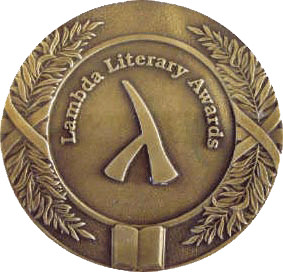
The winners of the 25th Annual Lambda Literary Awards were announced yesterday evening at the Great Hall at Cooper Union in New York.
Notably, this year is the first that the winner in a trans* fiction category is trans*, according to Imogen Binnie, a contributor for The Collection: Short Fiction from the Transgender Vanguard, which won in the transgender fiction category.
The Lambda Awards began in 1988 and aim to celebrate LGBT literature and unite the queer literary community. Nominated work must have “significant” LGBT-related content and literary merit. In the past, the awards have been criticized for transphobia, biphobia, representing only a fraction of queer creative output, and not representing queer creative output at all.
2011 was the first year there were both fiction and non-fiction categories for trans* works, and 2010 was the first year there were both categories for bisexual works. As recently as 2004, a transphobic book made the list of finalists in the transgender category until protests got it removed.
This year, there were transgender fiction and non-fiction categories. However, bisexual fiction and non-fiction were grouped together under “bisexual literature.” According to the submission guidelines, “transgender literature” and “bisexual literature” are only split into fiction and non-fiction when there are over 10 submissions of each. Despite the combined categories, there were two winners in bisexual literature: My Awesome Place: The Autobiography of Cheryl B by Cheryl Burke and In One Person by John Irving tied.
In 2009, the award guidelines were changed to specify that awards should go to LGBT-identified writers. In 2011, they changed again — people of any sexual orientation or gender can win in most of the award categories. Three categories that focus on writers’ careers are the exceptions, namely the Betty Berzon Debut Fiction Award (to one lesbian and one gay man), the Jim Duggins Outstanding Mid-Career Novelist Prize (to one female-identified and one male-identified author), and the Pioneer Award (to one female-identified and one male-identified individual or group). Judges must still self-identify as queer.
Under any configuration the awards have had their issues, some of which continue into the present — in the career categories, for instance, specifying only female- and male-identified award winners seems problematic at best.
The place of queerness and author identity, and their importance to writing, are so contested that last year authors began to debate them in their acceptance speeches. But while any awards can only represent a fraction of the available material and the Lambda Literary Awards can only represent a sliver of queer culture, they do recognize it, and the broader literary community recognizes them, and that’s something to get behind, no matter how imperfect they may be.
A partial list of the winners of the 2013 Lambda Literary Awards is as follows:
Transgender Fiction: The Collection: Short Fiction from the Transgender Vanguard, edited by Tom Léger and Riley MacLeod
Transgender Non-fiction: Transfeminist Perspectives In and Beyond Transgender and Gender Studies, edited by Anne Enke
Bisexual Literature: My Awesome Place: The Autobiography of Cheryl B, by Cheryl Burke, and In One Person, by John Irving
Lesbian General Fiction: The World We Found: A Novel, by Thrity Umrigar
Lesbian Memoir/Biography: Why Be Happy When You Could Be Normal?, by Jeanette Winterson
Lesbian Mystery: Ill Will, by J.M. Redmann
Lesbian Poetry: Sea and Fog, by Etel Adnan
Lesbian Romance: Month of Sundays, by Yolanda Wallace
Lesbian Erotica: The Harder She Comes: Butch/Femme Erotica, edited by D.L. King
LGBT Anthology: No Straight Lines: Four Decades of Queer Comics, edited by Justin Hall
LGBT Debut Fiction: The Summer We Got Free, by Mia McKenzie
LGBT Studies: Performing Queer Latinidad: Dance, Sexuality, Politics, by Ramón H. Rivera-Servera
Dr. James Duggins Mid-Career Novelist Prize: Nicola Griffith and Trebor Healey
Dr. Betty Berzon Emerging Writer Awards: Sassafras Lowrey and Carter Sickels
The Pioneer Award: Cherrie Moraga
The Board of Trustees Award for Excellence in Literature: Augusten Burroughs
Want to talk about books with girls and drinks? Lambda Literary Award finalist Jeanne Thornton and OR Books will be celebrating the winners and nominees of this year’s Lambda Literary Awards with a lovely get-together at our favorite New York lady bar, The Dalloway, tonight at 7:00 p.m. For more information and to RSVP, visit the Facebook event page.
